I have long loved the stylish and witty novels of Georgette Heyer (1902-1974) and I know that I am not alone. The actor, playwright and composer, Noël Coward, also enjoyed her novels and admired her technique – especially her clever use of irony. The novelist A.S. Byatt itemized why Heyer’s Regency novels were so successful: ‘Paradise of ideal solutions, knowing it for what it is, comforted by its temporary actuality, nostalgically refreshed for coping with the quite different tangle of preconceptions, conventions and social emphases we have to live with. Which is what good escape literature is about.’ Heyer did her research properly; her Regency world may be limited in its social range but she undoubtedly had the gift of drawing her readers in, holding them spellbound, and making them laugh and feel better.
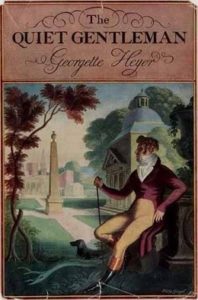
The Quiet Gentleman by Georgette Heyer 1951
So I’m going to indulge myself this week and look at why I enjoy The Quiet Gentlemen (1951). I have to admit that, as a teenager, The Quiet Gentleman wasn’t one of my favourite Heyer novels. Back then, I wanted my heroines to be beautiful, like Marianne Bolderwood, rather than the not particularly pretty Drusilla, the heroine of The Quiet Gentleman’, who is practical and down to earth. However, as I grew up my tastes changed and gradually I came to appreciate Drusilla.
Then, there is a school of thought which sees The Quiet Gentleman as a sort of unsatisfactory Sense and Sensibility, with Marianne Bolderwood as a more thinly drawn Marianne Dashwood, and Drusilla as a pale variation of the sensible Elinor Dashwood. One critic complained that the hero Gervase Frant, Earl of St Erth’s courtship of Drusilla Morville is almost non-existent.
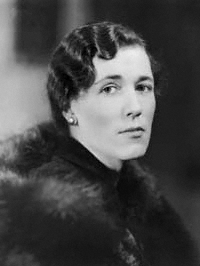
Georgette Heyer by Howard Coster, 1939
I don’t agree. I have learnt to enjoy the subtle steps by which Georgette Heyer indicates Gervase’s growing interest in Drusilla. To appreciate this, you need to attune your ear to the ironic – and irony is something Heyer does supremely well. Drusilla is not your usual Regency heroine. She is not particularly pretty, she employs no arts to attract, and her conversation is prosaic; ‘the Earl thought her dull.’
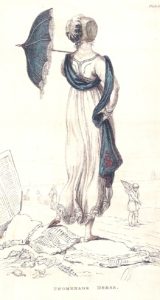
Promenade Dress 1809
However, he does notice that ‘she was dressed with propriety and even a certain quiet elegance’ and that, ‘Her countenance was pleasing without being beautiful, her best feature being a pair of dark eyes, well-opened and straight-gazing.’
Their relationship consists of a series of small encounters, each one adding to Gervase’s knowledge of her and his gradual discovery of exactly those qualities he needs in a wife. Their first conversation is not propitious. Drusilla says that she has been looking for him and the Earl’s response is decidedly cool. He raises his brows and says, ‘In what way may I serve you, Miss Morville?’

Statue of Mercury, Kenwood House
It is meant as a put down but Drusilla is not fazed. She replies that she is only concerned to serve the Dowager (the earl’s step-mother), and adds that she can see that he thinks she is guilty of presumption.
She has wrong-footed him and the earl reddens. It is the only time in the book where Gervase is put out of countenance; somehow she has got to him. When she adds, ‘I should have explained that I have no very great opinion of Earls’, her father is a Philosophical Historian writing a History of the French Revolution from a Republican point of view, we can see that his interest is caught.
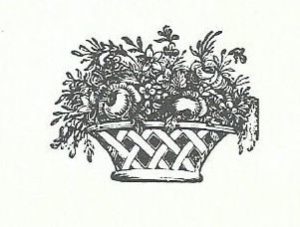
Basket of Fruit
She tells him about her background (her parents are intellectuals with advanced notions of women’s rights) and he is amused. She then persuades him to allow the huge epergne, an elaborate multi-branched dish – each branch supporting a smaller dish – and a centrepiece for the dining table, which Gervase thinks is atrociously ugly, and has ordered to be put away in a dark cupboard, to be displayed on a Buhl table in the window embrasure instead. As the Earl ruefully says later to his cousin, ‘I have let the wretched chit talk me into permitting the continuing existence of that abominable epergne in my dining-room!’
Somehow, Drusilla has negotiated a domestic compromise, stood up for herself, and amused him with her down to earth remarks. He has also learnt that she is well-used to society (she stays with her well-connected Morville relations for the Season) and, later, his step-mother remarks that, ‘the Morvilles must be supposed to rank amongst those of the best blood in the country’ in spite of Drusilla’s parents’ shocking Republican views. In other words, (though this is far from his thoughts at the beginning) marrying Drusilla would not be a misalliance.
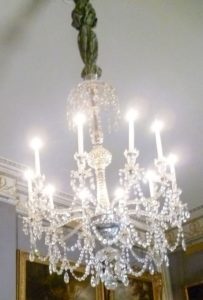
Chandelier, Kenwood House
Alert readers will notice the care with which Georgette Heyer lays her ground; Gervase is not yet interested in Drusilla but he no longer thinks she’s negligible.
Later, Gervase discovers that it is largely Drusilla who has organized the ball he is giving to celebrate his return to his ancestral home after the death of his father. Drusilla tells him that she enjoys it and the reader can see that it’s something she’s good at. We realize that Heyer has given her another tick; Drusilla would make a good chatelaine of Stanyon Castle.
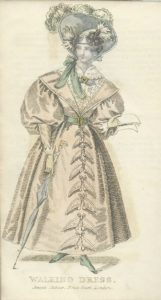
Walking Dress
Heyer allows Drusilla to be seen at her best at the ball wearing a gown in soft pink under a figured-lace robe which suits her (and it’s obviously not cheap). She has diamond drops in her ears, holds an antique fan and wears ‘a pair of very long French gloves of a delicate shade of pink which instantly awoke Marianne’s envy.’ Drusilla is, clearly, no dowd. Georgette Heyer obviously had a good eye for colour and fashion, something which always appealed to me.
When Gervase, being polite, asks Drusilla to dance the waltz, ‘she surprised him by proving herself to be an experienced dancer, very light on her feet…’ He asks her for another dance and makes it clear that this is what he wants; ‘I consider myself now at liberty to please myself.’ Dancing involves physical contact and subconsciously the Earl surely notes that their steps match.
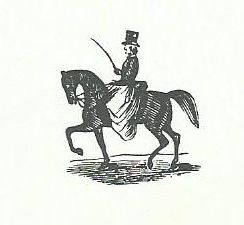
Lady on Horse
There is a significant moment about half-way through the book when Gervase’s horse throws him and Drusilla discovers that someone pulled a rope stretched across the path to bring him down. They discuss the implications and what line they should take. Gervase says, ‘I have a great dependence on your discretion, Miss Morville. We shall say, if you please, that I was so heedless as to let Cloud set his foot in a rabbit hole.’ They both know, though, that it was deliberate; someone means him harm.
Note that significant ‘we’. A few moments later, Gervase, Drusilla, and his friend Lord Ulverston are in a curricle driving back to the castle. They have to squeeze in but, ‘None of them are fat.’ Gervase puts his arm along the back of the curricle to give Drusilla a bit more room. Personally, I can’t help thinking that Drusilla would have felt Gervase’s arm behind her, even though it wasn’t touching her; and he would have been fully conscious of what he was doing. It raises the emotional temperature nicely.

Ceiling decoration, Kenwood House
What I particularly like about Heyer’s writing is that you, the reader, are left to make the inference for yourself – or not. She writes for the alert, intelligent reader.
I love Drusilla’s prosaic remarks; they make me laugh. It’s obvious to the reader (though not to Drusilla) that Gervase enjoys them, too. One of my favourites is her comment about the feminist Mary Wollstonecraft: ‘Mama has always maintained that most of the trouble arose from Miss Wollstonecraft’s determination to make him (her lover, Gilbert Imlay) an elm tree round which she might throw her tendrils. Very few gentlemen could, I believe, support for long so arduous a role.’

Regency Gentleman
The Earl says, ‘I find myself, as always, in entire agreement with you, Miss Morville,’ he said, gravely.’ And we cannot doubt the irony here, the word ‘gravely’ gives it away; he obviously enjoys it as much as the reader does.
When Drusilla comes to visit him (she’s been his nurse) after a second, more serious attack, where Gervase is shot, the Earl smiles at her and stretches out his right hand ‘in an unconsciously welcoming gesture.’
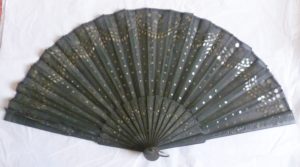
Ebony Fan
Drusilla looks at it and doesn’t move. When she does speak it is in ‘her most expressionless voice.’ It is obvious to the reader that Drusilla at least is well aware of her growing feelings for Gervase, and is determined to hide them. Gradually, as the plot thickens, the wounded Gervase and Drusilla are thrown together and we notice that they now touch each other unselfconsciously: she takes his pulse, he grasps her wrist. He holds her hand and then kisses it. He tells her that ‘she is a woman in a million.’

Staircase, Kenwood House
But Georgette Heyer cannot yet allow any words of love to be spoken. The villain is still at large and the plot needs to be wrapped up. For Heyer, less is definitely more; she keeps us on tenterhooks about Gervase’s own feelings and holds back, and, of course, this has the inevitable effect of making us all the more eager to read on.
The final scene is delicious. Drusilla knows that the Earl has ridden to see the man who, she now knows, is out to kill him and he hasn’t yet returned. In her haste, she catches her heel on the hem of her dress, falls down the stairs and breaks her arm. Up to now Drusilla has been in control of her emotions but when Gervase returns safe and sound, and kisses her, she bursts into tears and, for the first time, allows her own insecurities to show. I cannot resist quoting here:

Chaise Longue, Kenwood House
‘Oh no! Pray do not! You felt obliged to comfort me! I assure you, I don’t regard it – shall never think of it again!’
‘My poor dear, you must be very much shaken to say anything so foolish!’ said the Earl lovingly. ‘Never did I think to hear such nonsense on my sage counsellor’s lips!’
‘You would become disgusted with my odious common sense. Try as I will, I cannot be romantic!’ said Miss Morville despairingly.
His eyes danced. ‘Oh, I forbid you to try. Your practical observations, my absurd robin, are the delight of my life!’
Miss Morville looked at him. Then, with a deep sigh, she laid her hand in his. But what she said was: ‘You must mean a sparrow!’
‘I will not allow you to dictate to me, now or ever, Miss Morville. I mean a robin!’ said the Earl firmly, lifting her hand to his lips.
The critic who complained that the courtship between the Earl and Drusilla was negligible also complained that there was only one kiss. Well, there’s only one kiss between hero and heroine in Cotillion, The Grand Sophy and The Reluctant Widow, and many other Heyer novels. So what? For me, a long, anticipatory build up is just fine. And the fact that so many of Heyer’s novels are still in print, indicates that many other readers agree with me.
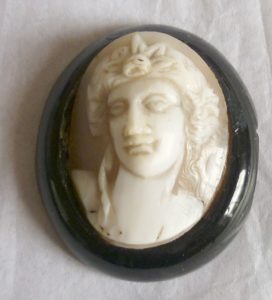
Cameo on jet
I like the fact that the reader has to be alert to the oblique signs of interest expressed by Gervase, and Drusilla’s rather touching, hidden emotional insecurity. The Quiet Gentleman is not an ‘in your face’ novel and, in my view, it’s all the better for that. Some of her novels, more obviously romantic, undoubtedly appeal to a younger readership, Devil’s Cub, for example. And others, especially those with an older heroine, or one who isn’t, perhaps, your traditional heroine, like Drusilla, or the shy, dowdy Hester in Sprig Muslin, needs a certain emotional maturity to be appreciated fully.
She once wrote to her publisher, ‘(Fans) expect me to be a Romantic, and I’m nothing of the sort.’ She is not a writer who indulges in over-emotional outpourings from the hero or heroine. There is a strong vein of realism in her depiction of her characters, which Dr Johnson would have approved of, and laughter often breaks through to restore a sense of equilibrium.

Georgette Heyer’s birthplace, 103 Woodside, Wimbledon. A blue plaque has just been put up in her memory above the porch and slightly to the right. The ceremony was conducted by Stephen Fry.
She gave an immense amount of pleasure to a lot of people, and I can’t see our need to escape for a while into her Regency world is going to grow less.
Elizabeth Hawksley
Please share this page...
I adore Georgette Heyer, and The Quiet Gentleman is also one of my favourites. I really enjoyed your post, and the images, too. I wrote about another of my favourites, The Unknown Ajax, in this post here, and thought you might be interested https://helenafairfax.com/2014/01/24/georgette-heyer-mistress-of-regency/
It’s an enormous shame she’s underrated by many, but great to come across fans who love her as much as I do!
Thank you for your comment, Helena. It’s always a pleasure to meet a fellow enthusiast! Thank you, too, for the link to your Unknown Ajax post which I shall look at this evening – and, I assure you, I’m looking forward to doing so.
No, TQG always makes me cross. I like the heroine and the gentle courtship, but I cannot forgive GH for the clumsy way she must have decided to make one of her characters the villain well after she’d started the book. Re-reading it (as of course I have many times), this person simply cannot be seen as someone who would harm Gervase. It spoils it for me.
Thank you for your comment, Jane. I cannot agree with you about the unlikelihood of Theo being the villain. I’ve always thought Georgette Heyer set it up rather well. Take the opening of Chapter 4, where we get Theo’s back story. Remember Lord Ulverston’s comment about Selina Daventry, daughter of the Duke of Arun, at the end of the book, ‘Bad blood there, devilish bad blood!’ Breeding was always important to Georgette Heyer, and Theo’s ‘blood’ and his breeding, at least up to the age of five, was pretty awful.
OK, Theo is ‘stolid, even-tempered’ and ‘taciturn’, as well as being intelligent and able, and we know that ‘he was devoted to the Frant interests’ but this, for me, raises a niggle of unease. Coupled with the fact that the sixth Earl left poor Theo very badly provided for, the situation is ripe for mischief. In my view, Theo should have been left £10,000, the traditional inheritance for a younger son. OK, Theo wasn’t a son but only a first cousin once removed, but, considering the hard work he’d put in at Stanyon, I think he deserved to be treated as a son and the fact that he wasn’t could easily left him with a feeling of burning resentment, which, in his taciturn way, he hides.
Nothing excuses Theo’s trying to kill Gervase, but, in my view, Gervase should have insisted on making Evesleigh over to his cousin.
This is one of my favourite Heyers. I agree completely that the subtle indications of the growing affection between the two are charming. I think it reflects very much how love likely was in actuality in the period. It grows quietly.
On the other hand the story’s focus is much more on the attempts to kill Gervase and the light mystery of whodunnit than the romance. Probably why when young, like you it didn’t appeal as much as other Heyer books.
Thank you for your comment, Elizabeth. I agree with you; in my teens, ‘The Quiet Gentleman’ didn’t appeal to me much but it grew on me!
Thank you, Elizabeth. It is a long time since I read The Quiet Gentleman, but you have brought it all back to me, with all its nuances. I, too, came to appreciate this book more as I grew older; Drusilla is a comfortable woman, and one I would very much like to have as a friend. I might just have to look it out and read it again now!
Thank you for your comment, Melinda. I think you would find re-reading ‘The Quiet Gentleman’ very rewarding. There are a number of characters whose views and behaviour make me laugh out loud – the ghastly dowager Countess, for one!
I too love The Quiet Gentleman. Aother of GH’s underrated books, but full of quiet characterisation. I particularly love the way Drusilla’s mama, in very few appearances, makes it plain that she’s a mother first and a forward-thinking female afterwards!
I absolutely agree with you about Mrs Morville, Jan. Some of her exchanges with her husband make me laugh out loud.
I loved it, too – and always thought the the developing feelings were obvious. I absolutely LOVED Drusilla’s final response – more, almost than any other denouement in any other novel.
Thank you for joining in the conversation, Lesley. That ending is lovely, I agree. Drusilla has been quietly competent for most of the novel, and she’s wonderfully patient with the Countess. I love the way we are gradually allowed to see her vulnerabilities – like in that brilliant conversation with herself: Miss Morville versus Drusilla. We really feel for her.
Every word of Georgette Heyer’s Regency novels is note perfect – she had a rare ear for language, which is why I don’t think these romances have dated. I adore The Grand Sophy with her refusal to be defeated by any of life’s reverses; in a quieter and less feisty way, Drusilla Morville is cut from the same cloth – quick witted, cool, unfazed by snobbery and putdowns, with immaculate taste – a foe worthy of any man’s steel.
Thank you for your comment, Prem. Like you, I love Drusilla, but I’m not sure that she’s quick-witted, as such. She’s not really attuned to irony but, on the other hand, her practical down to earth observations do just as well.
I am a huge fan of Heyer’s Regency novels, but I have to confess my favourites are still the ones I adored as a teenager like “Devil’s Cub”. As I have grown older I can appreciate the less romantic stories such as The Quiet Gentleman, which I didn’t rate at all on first reading, but it would never make my personal Top Ten Heyer list. Mind you, the number one spot on that list tends to change every time I pick up one of my favourites because I am so impressed with the current book I am re-reading!
Thank you for joining the conversation, Gail. I, too, loved ‘Devil’s Cub.’ My copy is a Peacock book, a short-lived imprint of Penguin Books, aimed at teenagers, and standing between Penguins for adults and Puffins for children. It has a great cover design by the well-known historical book illustrator, Victor Ambrus, of a late 18th century gentleman with a cocked hat, scarlet coat and white breeches, riding furiously – obviously Dominic. On the back cover, a similar-looking man drives a coach and four. Both pictures are full of movement.
The illustrations catch the excitement, danger and thrill of the book itself. I must re-read it!